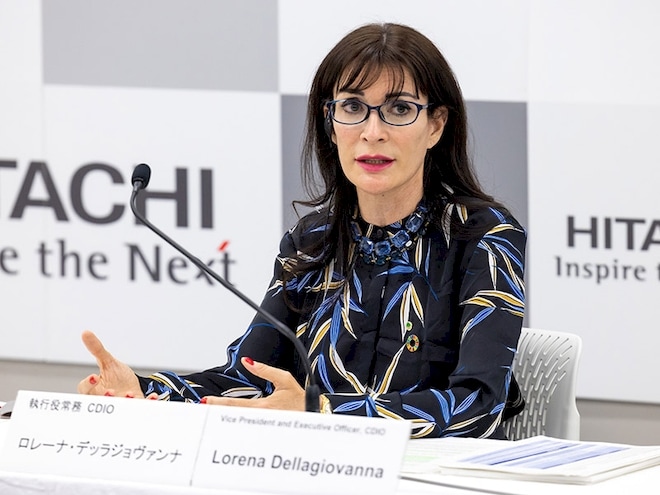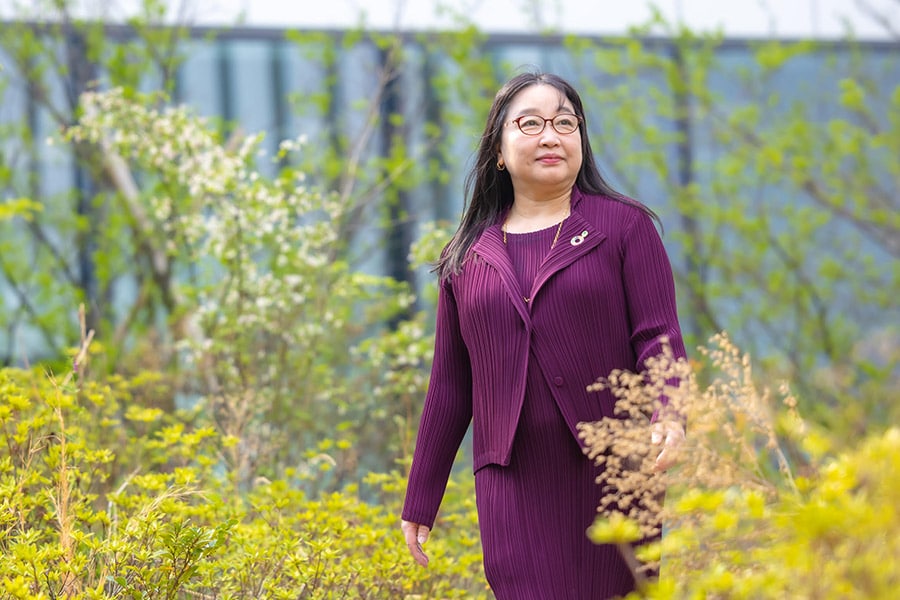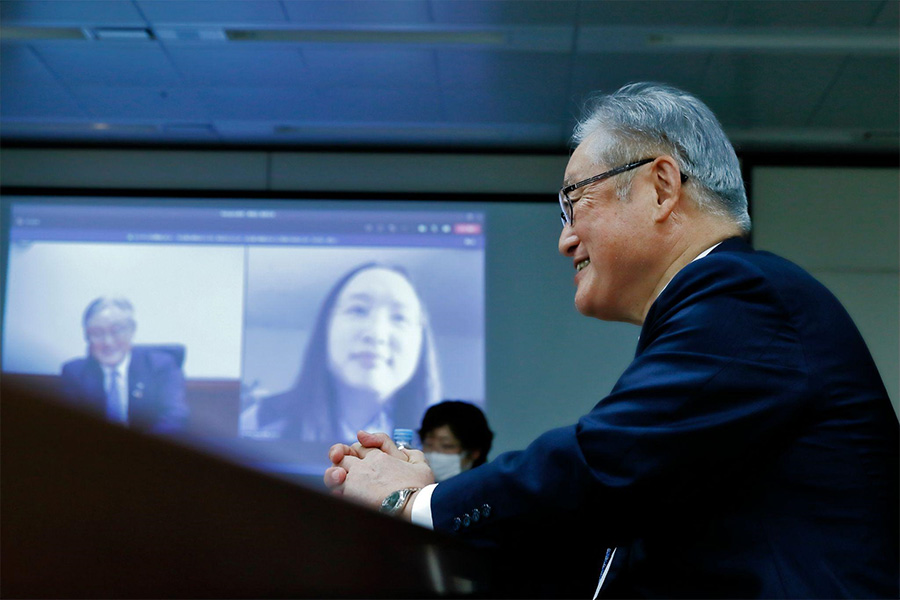The meaning of D&I told by the Chief Diversity & Inclusion Officer
Sep. 8, 2021
Makiko Saito

Respecting and drawing on the strengths of each person’s individual traits, regardless of outer attributes such as gender, nationlaity, race, religion, background, age, abled or disabled status, and sexual orientation – this is the concept behind diversity and inclusion (D&I) which is expanding in Japanese society. Within this development, Hitachi has set a target to increase the ratio of female and non-Japanese executive and corporate officers to 30% each by the fiscal year 2030.
Ms. Lorena Dellagiovanna, originally from Italy, has taken on a leading role in implementing diversity at Hitachi. In April 2021, she was appointed the first female Vice President and Executive Officer in the history of Hitachi, after which she announced strategies to achieve the goals of D&I. Now her role further extends to environmental activities and ESG. We sat with Ms. Dellagiovanna, to hear about the career she has achieved so far, and how she has approached matters of diversity.
Learning about ways of thinking that differ from your own
--First, we would like to ask about yourself. Please tell us about how you came to build your career at Hitachi, and what you find rewarding about your work.
If I were to say it in one word, I would say I joined Hitachi because I like “challenges.” I didn’t have any engineering knowledge or experience, but my unfamiliarity with the field rather piqued my interest. I wanted to get out of my comfort zone and take on a new challenge. I was also drawn by the fact that Hitachi is a large company with various kinds of business worldwide and the rich diversity of the people who works there.
Since I joined Hitachi, I feel as if I have worked in a number of companies with differing environments and cultures. I have learned a lot from being involved with a diverse range of fields and taking on different roles for each of them.
Ever since joining Hitachi, I have endeavored to correctly understand the business frontlines. I have visited factories and asked the people in charge about what they are developing and manufacturing, as much as possible. On each occasion, factory workers explained the usage of all the items to me, from large power transformers to small parts. The more business knowledge I gain, the more I can expand my contribution.
--It sounds like you worked to gain a deeper understanding of business through communication with the persons in charge of the frontlines.
Engaging in active communication at the frontlines has been advantageous in working together with people of diverse backgrounds. The more you open your mind, the more you can learn about ways of thinking that differ from your own, which then allows you to learn from them and be more productive and efficient in your business. When I was assigned in London 11 years ago, I branched out from the Italian community and interacted with people of various nationalities as much as possible.
I am always asking myself, ‘Am I forcing my Italian sensibilities onto others around me? Am I interacting with people without prejudice?’ I do this because if we’re not careful, we can easily behave rudely and cause distress or discomfort to others.
Whenever I come across someone who thinks differently from me, I search for the reasons why that may be. These kinds of experiences in communication are useful in my current work in promoting diversity as well as in my work in new fields such as environmental issues.
To quit taking on challenges is to face real failure
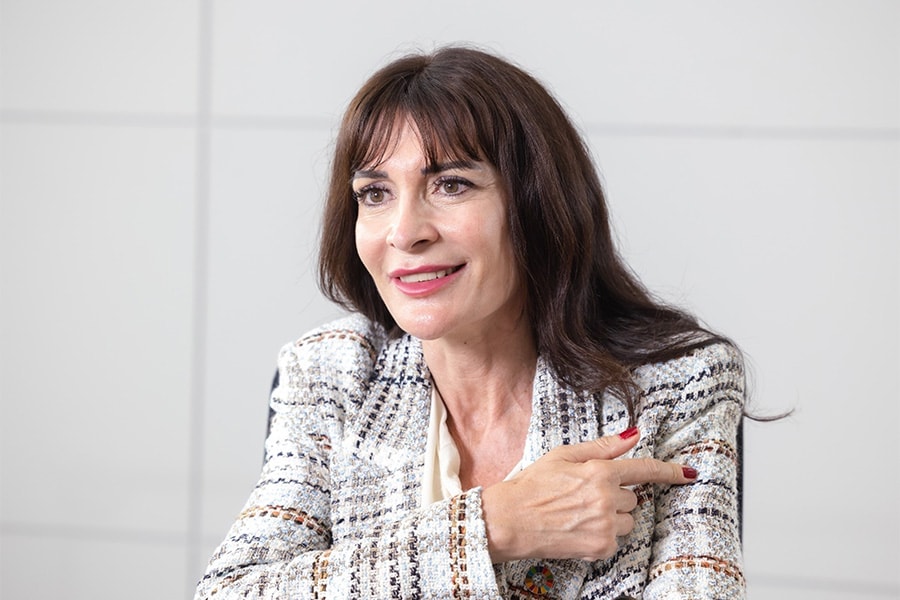
--Many companies in Japan are also attempting to implement diversity, but it has been pointed out that many female employees tend to be hesitant to take on management positions. What do you think lies behind this trend?
Coming to Japan, I feel that, compared to Europe, there is a strong tendency toward avoiding failure. I would imagine that many believe the risk of failure rises when one takes on a role of responsibility. They worry about what to do if they fail instead of having confidence in one’s own ability to take on a new role.
But it is, naturally, very common for things to not go well when handling a new experience. That is not failure in the true sense. To quit taking on challenges is to face real failure. You cannot succeed if you don’t take on challenges.
Of course, it is not good to repeat the same failure many times over, but aside from fairly extreme examples, failures can be corrected. When the risk of failure is large, such times rather present great opportunities for new experiences. Instead of fearing failure, I would like people to positively approach such risks with passion and curiosity.
--Are there any other possible societal factors?
The ‘gender framework’ ingrained in society may be another hindrance for women to take on challenges. There’s a general view that ‘having ambition is a masculine trait.’
But think back on your childhood. I am sure that everyone had dreams as a child. It is only natural to try and realize those dreams. There should be nothing wrong with moving toward your ambitions with your own set of morals and ethics.
During meetings with female employees at Hitachi, I introduce my experiences, and encourage them to speak up, have ambitions, and take on challenges. I tell them that “Everyone has failures, including me. Failures are an opportunity to grow.” I believe that we can change the company’s way of thinking and culture by continuously giving this message to employees.
Not aiming for perfection too much is also important
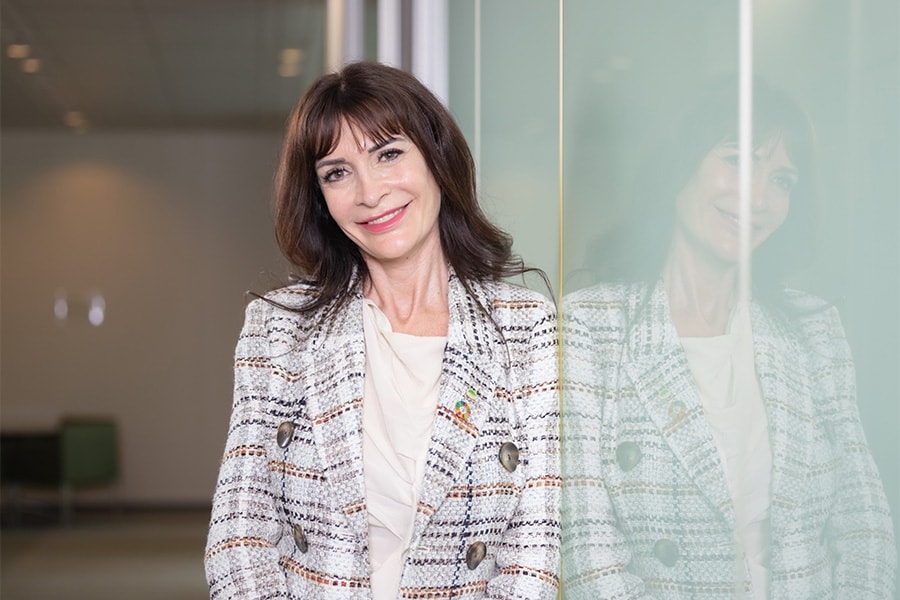
--Problems with language are unavoidable when communicating with people of diverse backgrounds. In Japan, many do not feel confident toward having conversations in English, but we need to break free from the “fear of failure” mindset to achieve proactive communication.
I’m not a native English speaker, but I make an active effort to talk to everybody in English. (Now I’m actually studying Japanese although it’s very tough.) Understanding what the person who you are talking to is trying to say is more important than speaking perfect English.
Hitachi is working on several international joint development projects, and even if the engineers aren’t fluent in English, they ultimately understand each other.
It seems that because the people of Japan demand such high quality, there is a strong tendency toward perfectionism. This is admirable, but I think there are times when it is important to not aim too much for perfection.
Even Michael Jordan, who was heralded as a genius of a basketball player, likely missed many shots while aiming for great heights. Our communication is no different. In the context of the work environment, managers need to accept the failures of subordinates rather than criticizing them.
--In order to implement diversity and inclusion (D&I), Hitachi established a new Chief Diversity & Inclusion Officer (CDIO) position in April 2020, to which you were appointed. Could you share your initiatives so far and your aspirations for the future?
As Hitachi’s CDIO, I have communicated to all employees, from newcomers to experienced long-timers, that “D&I will be the driving force behind further growth for Hitachi.” Together with the leaders of each business, I have shared ideas and considered methods for incorporating D&I into each business. I feel that we are prepared to take a new step toward utilizing D&I in line with our business strategies.
D&I does not stop with the inclusion of women. Hitachi considers gender, nationality, race, religion, background, age, abled or disabled status, sexual orientation, or any other characteristics as unique individual traits. Every individual is unique, and exclusions must not be made based on differences.
In aiming to create a workplace where diversity is leveraged and employees are valued , we will approach from 5 pillars: leadership commitment, culture, recruitment, retention, and advancement of talents. Actions include advancing training that addresses unconscious bias, and supporting activities of employee resource groups (ERG: Employee lead groups based on shared characteristics and experience). I would also like to achieve putting D&I elements in recruiting activities, having direct coummication with future leaders through mentoring and group sessions, as well as developing a concrete communication strategy that shows Hitachi’s leadership commitment toward D&I.


